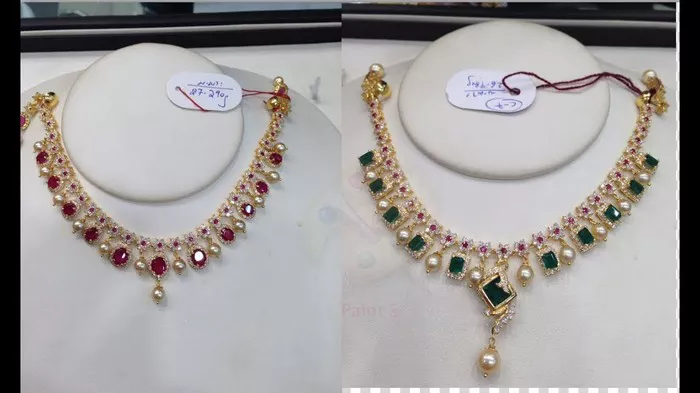Selling a diamond necklace can be a significant decision, whether you’re looking to upgrade, downsize, or simply liquidate assets. Finding the right place to sell ensures you receive a fair price and a smooth transaction process. This comprehensive guide explores various options for selling diamond necklaces, including jewelry stores, online marketplaces, auction houses, and private buyers. It covers considerations such as pricing strategies, authentication processes, selling fees, and tips for maximizing your sale. Whether you’re a first-time seller or a seasoned jewelry enthusiast, this article aims to equip you with the knowledge needed to make informed decisions and achieve the best value for your diamond necklace.
Understanding the Value of Your Diamond Necklace
Before diving into where to sell your diamond necklace, it’s crucial to understand its value and factors that influence pricing:
Diamond Grading and Certification:
4Cs: Evaluate the diamond based on Cut, Color, Clarity, and Carat Weight. These factors determine the diamond’s quality and market value.
Certification: Obtain a reputable diamond grading report (e.g., GIA, AGS) to authenticate the diamond’s attributes and ensure transparency in the selling process.
Market Trends and Demand:
Current Market Conditions: Research the market trends for diamond necklaces, including popular styles, preferences, and demand for specific diamond characteristics.
Price Comparisons: Compare prices for similar diamond necklaces sold recently to gauge the competitive market value.
Best Places to Sell Your Diamond Necklace
When deciding where to sell your diamond necklace, consider the following options based on your preferences, timeline, and desired selling price:
1. Jewelry Stores and Retailers
Pros:
Expert Appraisal: Receive professional appraisal and valuation from experienced jewelers.
Established Reputation: Benefit from the store’s established reputation and customer base.
Immediate Payment: Often offer immediate payment upon agreement.
Cons:
Lower Offers: May offer lower prices compared to private buyers or online platforms.
Limited Audience: Potential buyers limited to local clientele unless the store has a strong online presence.
2. Online Marketplaces
Pros:
Global Reach: Access a wide audience of potential buyers worldwide.
Competitive Bidding: Auction-style platforms may drive up the selling price through competitive bidding.
Control Over Listing: Set your desired price and manage the selling process independently.
Cons:
Seller Fees: Pay listing fees, transaction fees, and/or commissions to the platform.
Security Concerns: Risk of scams or fraudulent transactions; choose reputable platforms with secure payment methods.
3. Auction Houses
Pros:
Expertise and Promotion: Benefit from the expertise of auction house specialists in jewelry sales.
Competitive Bidding: Auctions can attract high-net-worth buyers willing to pay premium prices.
Potential for High Returns: Achieve higher selling prices, particularly for unique or high-value diamond necklaces.
Cons:
Commission Fees: Pay commission fees based on the final sale price, which can be significant.
Longer Selling Process: Auctions may take time to organize and complete, delaying payment.
See Also: 10 Best Men’s Gold Cross Necklaces in 2024
4. Private Buyers and Consignment Shops
Pros:
Negotiation Flexibility: Direct negotiation with potential buyers or consignment shops.
Personalized Service: Receive personalized attention and potentially higher offers for unique pieces.
Quick Sale Possible: Depending on the buyer, you may receive immediate payment.
Cons:
Trust and Verification: Verify the buyer’s credentials and ensure a secure transaction.
Limited Audience: Limited reach compared to online platforms or auction houses.
Tips for Maximizing Your Sale
Regardless of where you choose to sell your diamond necklace, consider these tips to optimize your selling experience and maximize the sale price:
Professional Cleaning and Presentation: Present your diamond necklace in its best light by having it professionally cleaned and polished.
Accurate Description and Documentation: Provide detailed descriptions, photographs, and relevant documentation (e.g., diamond certificate) to enhance buyer confidence.
Set a Realistic Price: Research comparable sales and set a competitive yet realistic price to attract potential buyers.
Negotiation Strategies: Be prepared to negotiate but know your bottom line to ensure a fair deal.
Secure Payment Method: Use secure payment methods to safeguard against fraud and ensure a smooth transaction.
Conclusion
Selling a diamond necklace involves careful consideration of where to sell, how to price, and how to navigate the selling process to achieve the best outcome. Whether you opt for the expertise of jewelry stores, the global reach of online marketplaces, the prestige of auction houses, or the personalized service of private buyers, each option has its advantages and considerations. By understanding the value of your diamond necklace, researching market trends, and following best practices for selling, you can confidently navigate the selling process and secure the best value for your precious jewelry piece. Remember, informed decisions and thorough preparation are key to a successful and rewarding selling experience.

